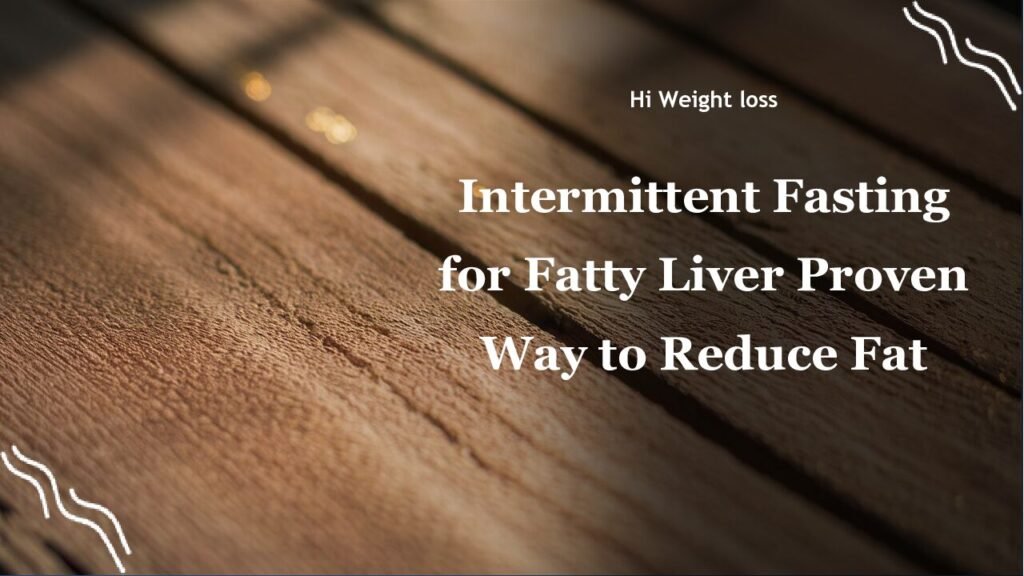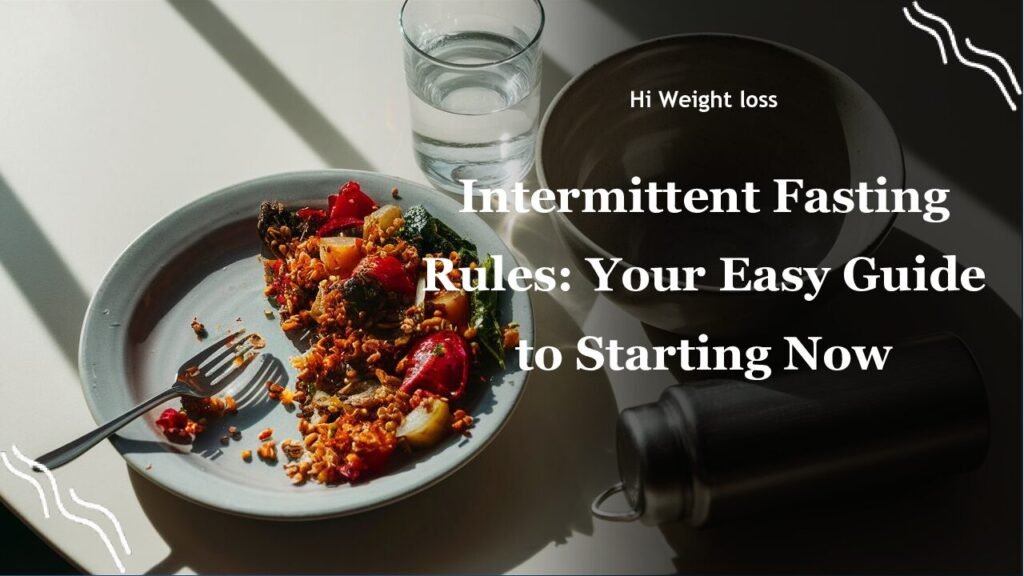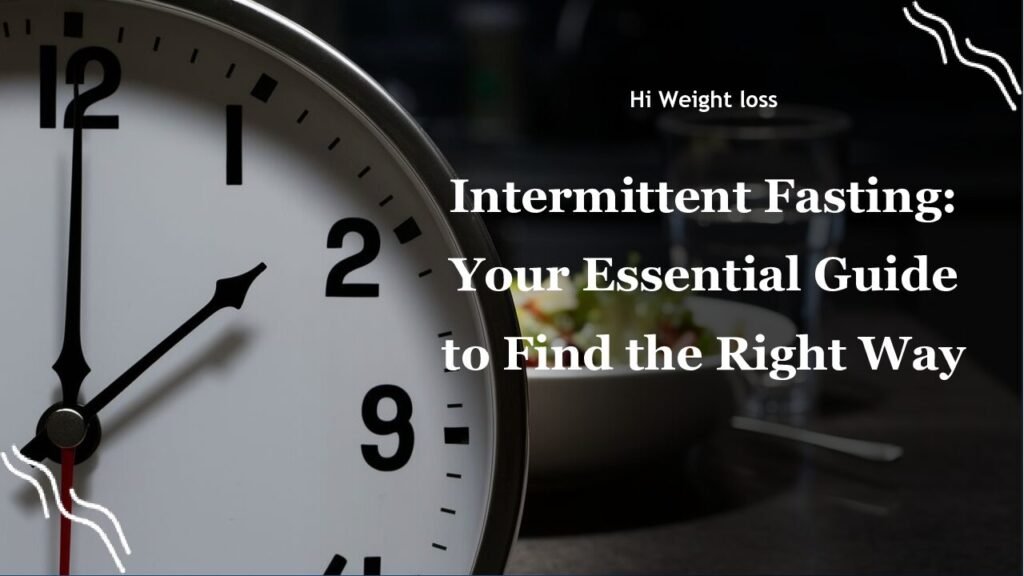“`
Are you struggling with a fatty liver and feeling overwhelmed by conflicting health advice? It’s frustrating to navigate the maze of diets, only to find little progress. You might be wondering, “Does intermittent fasting reduce fatty liver?” The good news is, research suggests that combining intermittent fasting with exercise could be a powerful way to tackle this issue, not only reducing fat around your liver but also improving your overall metabolic health. In this article, we’ll explore how intermittent fasting works, what the science says, and how you can make it part of your journey to a healthier liver.
Does Intermittent Fasting Reduce Fatty Liver?
The short answer is, yes, it appears so. Several studies show that intermittent fasting can indeed reduce fatty liver. But it’s not just about the fasting, it’s about how it impacts your body and, specifically, your liver. Think of your liver like a hard-working factory, constantly processing everything you eat and drink. Sometimes, it gets overloaded, leading to a buildup of fat. This condition is called nonalcoholic fatty liver disease (NAFLD), and it’s more common than you might think.
The Science Behind Intermittent Fasting and Fatty Liver
Intermittent fasting isn’t a fad diet; it’s a way of eating that cycles between periods of eating and voluntary fasting. I remember when my friend, Sarah, was diagnosed with NAFLD. She was overwhelmed, but after researching, she cautiously started intermittent fasting, combined with regular walks, and was amazed at her results. The concept behind it is simple: when you fast, your body begins to use stored fat for energy, which can dramatically reduce the amount of fat in your liver. A study published in *Cell Metabolism* supports this by showing that combining intermittent fasting with exercise significantly reduced liver fat.
Research also indicates that intermittent fasting affects proteins within the liver, such as the HNF4-(alpha) protein, crucial for metabolic functions. This was discovered through a study at the University of Sydney using state-of-the-art analytical tools. This suggests that intermittent fasting is not just about losing weight; it’s about optimizing how your liver functions.

Can Intermittent Fasting Lower Liver Fat?
Absolutely. When you engage in intermittent fasting, your body enters a state where it starts burning fat for energy because glucose stores are depleted. It’s like flipping a switch. This process helps reduce fat deposits all over your body, including within your liver. Several studies have confirmed this. One study published in *Cell Metabolism* demonstrated that those combining alternate-day fasting with exercise saw a significant reduction in intrahepatic triglyceride (IHTG) content, which is a specific marker of liver fat.
For me, the idea of fasting was daunting at first. But when I realized it wasn’t about starving myself, but about strategically managing my eating window, it seemed much more doable. The key is to choose a method that suits your lifestyle and stick to it. You may be wondering what types of intermittent fasting are best suited for reducing liver fat. Let’s explore this further.
How Does Intermittent Fasting Affect Nonalcoholic Fatty Liver Disease (NAFLD)?
NAFLD is a condition that’s closely linked to insulin resistance and obesity. Intermittent fasting has been found to improve insulin sensitivity, which is important because it allows your body to use glucose (sugar) more efficiently. When your body is more sensitive to insulin, less fat gets stored in your liver, helping to reverse NAFLD. Another benefit is weight loss. Weight loss is one of the most effective ways to reduce liver fat, and intermittent fasting can be a very efficient way to achieve this.
When my cousin, Mike, received his NAFLD diagnosis, he was determined to make changes. He started with a 16/8 fasting method (eating within an 8-hour window and fasting for 16 hours), and he saw improvement in his liver enzymes within just a few months. It’s amazing what a small, consistent change can do. Of course, you have to consult with your doctor, but the results can be compelling. So, what are the most effective intermittent fasting methods?
Different Intermittent Fasting Methods to Try
There are several ways to approach intermittent fasting, each with different time windows for eating and fasting. It’s essential to pick a method that fits your schedule and personal preferences. Here are a few of the most common approaches:
- The 16/8 Method: This is one of the most popular methods, where you fast for 16 hours a day and eat within an 8-hour window. Many find this method easy to integrate into daily life, usually by skipping breakfast.
- The 5:2 Diet: With this approach, you eat normally for five days a week and restrict your calorie intake to about 500-600 calories on the other two days. This is an effective way to reduce your overall weekly caloric intake.
- Alternate-Day Fasting: This method involves fasting every other day. Some people find this one quite challenging, but it can be effective for quick results.
Each method works by triggering the metabolic shifts that lead to fat reduction. The key is consistency. Try experimenting with each method and see which feels best for you. Do remember to consult with a health professional before starting any new fasting regime, especially if you have existing health issues. Which brings me to this important question: what else can you do to improve your liver health?
Combining Intermittent Fasting with Other Healthy Habits
To maximize the benefits of intermittent fasting, it’s essential to pair it with other liver-friendly habits. Remember, it’s not just about what you do when you’re *not* eating, but what you do when you *are* eating, too. It’s also beneficial to add physical activity to your plan. Combining intermittent fasting with regular exercise can have an amazing impact on liver health. Studies show it is a highly effective approach.
You should also try to eat a healthy and balanced diet that’s rich in fruits, vegetables, and lean proteins. It’s important to avoid processed foods, sugary drinks, and excessive amounts of unhealthy fats. These types of food are your liver’s enemies! In my personal experience, I’ve learned that small changes, like swapping out sugary drinks for water, or choosing a salad over a fast-food option, can make a significant difference.
| Habit | Why It Helps |
|---|---|
| Intermittent Fasting | Reduces fat stores, improves insulin sensitivity, supports metabolic health |
| Regular Exercise | Reduces body fat, improves liver function, enhances overall fitness |
| Balanced Diet | Provides essential nutrients, reduces liver stress, promotes healthy metabolism |
| Hydration | Supports liver detoxification, aids in digestion and nutrient absorption |
These steps all work in synergy to improve your overall health, with a special focus on reversing fatty liver. So, you’re ready to embark on this journey? Before you do, let’s take a look at some of the frequently asked questions.
Conclusion
So, does intermittent fasting reduce fatty liver? The evidence overwhelmingly suggests that it can. Through mechanisms like reducing fat stores, improving insulin sensitivity, and optimizing metabolic health, intermittent fasting offers a tangible path to improving liver health. It’s not about a quick fix; it’s about adopting a sustainable approach to wellness. Sarah, my friend who adopted this regime, often tells me that consistent effort in eating right, doing some form of exercise, along with intermittent fasting, is really what got her back in the game. Just be sure to remember to consult with your doctor first before embarking on this kind of journey.
If you’re struggling with fatty liver, consider giving intermittent fasting a try. By carefully combining this with a balanced diet and physical exercise, you can make a significant positive difference. Why not start today? Share this article with friends and family who may benefit and take the first step towards a healthier liver!
FAQ
Is intermittent fasting safe for everyone?
Intermittent fasting is generally safe for most healthy adults. However, it’s not recommended for pregnant or breastfeeding women, those with a history of eating disorders, or individuals with certain medical conditions. Always consult with your healthcare provider before starting any new diet or fasting routine.
How quickly can intermittent fasting reduce fatty liver?
Results vary from person to person, but some individuals experience improvements in liver function and fat reduction within a few weeks to months. Consistency is crucial, and results are often more noticeable when intermittent fasting is combined with a healthy diet and exercise.
Can I exercise while intermittent fasting?
Yes, in fact, combining exercise with intermittent fasting can amplify the benefits. Moderate aerobic exercise, like brisk walking, jogging, or swimming, is often recommended. Adjust your exercise routine to match your fasting periods, ensuring you’re properly hydrated and nourished during your eating windows.
What should I eat during my eating windows?
Focus on nutrient-dense foods, such as whole grains, lean proteins, healthy fats, fruits, and vegetables. Avoid processed foods, sugary drinks, and unhealthy fats. Eating mindfully will help you make the most of your eating periods.
Are there any side effects to intermittent fasting?
Some people may experience mild side effects when starting intermittent fasting, such as hunger, irritability, or fatigue. These usually subside within a few days as your body adjusts to the new eating pattern. Make sure you drink enough water and eat adequate amounts of nutrients during your eating windows.
“`



